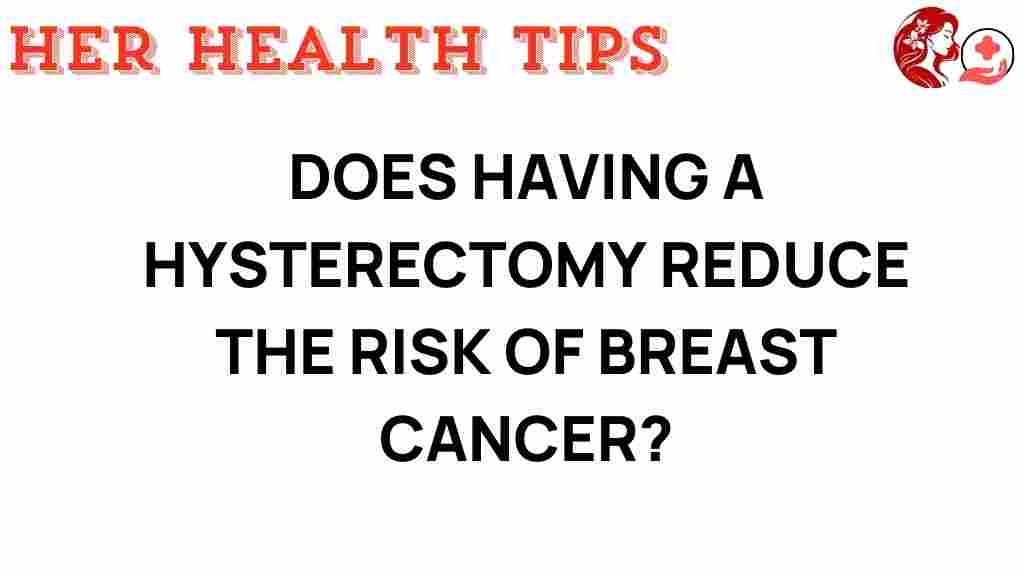Unraveling the Connection: Does a Hysterectomy Lower Breast Cancer Risk?
When it comes to women’s health, the relationship between various medical procedures and health outcomes is a topic of significant interest. One question that often arises is whether a hysterectomy can lower breast cancer risk. With breast cancer being one of the most common cancers among women, understanding the impact of gynecological surgery on cancer prevention is crucial. This article delves into the connection between hysterectomy and breast cancer risk, exploring hormonal changes, medical research, and health insights.
Understanding Hysterectomy
A hysterectomy is a surgical procedure that involves the removal of the uterus. In some cases, other reproductive organs, such as the ovaries and fallopian tubes, may also be removed. This procedure is often recommended for various reasons, including:
- Uterine fibroids
- Endometriosis
- Uterine prolapse
- Abnormal uterine bleeding
- Certain types of cancer
While a hysterectomy can provide relief from various gynecological issues, it is essential to consider the long-term health implications, particularly regarding breast cancer risk.
Hormonal Changes Post-Hysterectomy
One of the most significant effects of a hysterectomy, especially when the ovaries are removed, is the change in hormone levels. The ovaries produce hormones such as estrogen and progesterone, which play a crucial role in regulating the menstrual cycle and overall reproductive health. After a hysterectomy, women may experience:
- Hormonal imbalance
- Menopause (if ovaries are removed)
- Changes in mood and energy levels
- Increased risk of osteoporosis
The relationship between estrogen levels and breast cancer risk has been a focal point of medical research. Estrogen is known to promote the growth of some types of breast cancer cells. Therefore, the reduction of estrogen levels following a hysterectomy may influence breast cancer risk.
Current Medical Research on Hysterectomy and Breast Cancer Risk
Several studies have attempted to explore the connection between hysterectomy and breast cancer risk. Here are some key findings:
- Some research suggests that women who undergo a hysterectomy with ovarian conservation (where the ovaries are not removed) may have a slightly increased risk of breast cancer compared to those who have both the uterus and ovaries removed.
- Conversely, women who have their ovaries removed during a hysterectomy may experience a decreased risk of developing breast cancer due to lower estrogen levels.
- There are mixed results on whether a hysterectomy affects the overall risk of breast cancer, with some studies showing no significant correlation.
It is essential to note that while these studies provide valuable insights, more extensive research is needed to draw definitive conclusions.
Factors Influencing Breast Cancer Risk
Several factors contribute to breast cancer risk, and a hysterectomy is just one aspect. Other critical factors include:
- Genetic predisposition (e.g., BRCA1 and BRCA2 mutations)
- Age at first menstruation and menopause
- Family history of breast cancer
- Body weight and physical activity levels
- Alcohol consumption
Women should consider these factors in conjunction with the decision to undergo a hysterectomy. Engaging in open discussions with healthcare providers can help in understanding individual risk profiles better.
Health Insights: Cancer Prevention Strategies for Women
Regardless of whether a hysterectomy is performed, women can take proactive steps to lower their breast cancer risk. Here are some effective cancer prevention strategies:
- Regular screenings: Annual mammograms and clinical breast exams are essential for early detection.
- Healthy lifestyle: Maintaining a balanced diet, exercising regularly, and managing weight can significantly reduce cancer risk.
- Avoiding tobacco: Smoking is linked to various cancers, including breast cancer.
- Limit alcohol intake: Reducing alcohol consumption can help lower breast cancer risk.
- Genetic testing: Women with a family history of breast cancer may benefit from genetic counseling and testing.
For more detailed health insights, check out this comprehensive guide on cancer prevention.
Step-by-Step Process: Making an Informed Decision
Deciding to undergo a hysterectomy is a significant choice that should be made with careful consideration. Here is a step-by-step process to help guide women through this decision:
- Consult with a healthcare provider: Discuss symptoms, potential diagnoses, and treatment options.
- Understand the procedure: Learn about the types of hysterectomy (total, partial, radical) and what to expect during recovery.
- Discuss hormonal implications: Explore how the surgery might affect hormone levels and potential menopausal symptoms.
- Evaluate individual risk factors: Consider personal and family medical history, including breast cancer risk.
- Explore alternative treatments: If applicable, look into non-surgical options that may address symptoms without the need for a hysterectomy.
- Make an informed decision: Weigh the benefits and risks of the procedure and feel confident in the choice made.
Troubleshooting Common Concerns
After a hysterectomy, many women may have concerns about various aspects of their health. Here are some common concerns and troubleshooting tips:
- Hormonal changes: If experiencing severe menopausal symptoms, discuss hormone replacement therapy (HRT) options with a healthcare provider.
- Weight gain: Engage in regular physical activity and maintain a healthy diet to manage weight post-surgery.
- Emotional health: Seek support from friends, family, or professionals if facing emotional challenges after surgery.
- Follow-up care: Attend all scheduled follow-up appointments to monitor recovery and address any ongoing health concerns.
Conclusion
The connection between hysterectomy and breast cancer risk is complex and influenced by various factors, including hormonal changes and individual health profiles. While some studies suggest that removing the ovaries may reduce breast cancer risk, the overall relationship remains an area of ongoing research. Women are encouraged to prioritize their health by engaging in preventive measures, maintaining open communication with healthcare providers, and making informed decisions regarding surgical options. For further insights into women’s health, consider exploring additional resources and studies on cancer prevention and gynecological surgery.
This article is in the category Conditions and created by HerHealthTips Team
